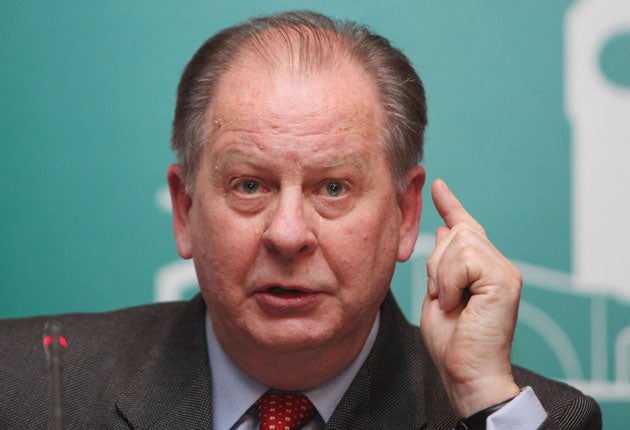Pay and Parliament: Ipsa chief says ducking decision on MPs' wages risks another expenses scandal
Sir Ian Kennedy ridicules politicians' objections to Ipsa plans after they wanted to be relieved of setting own pay

Your support helps us to tell the story
From reproductive rights to climate change to Big Tech, The Independent is on the ground when the story is developing. Whether it's investigating the financials of Elon Musk's pro-Trump PAC or producing our latest documentary, 'The A Word', which shines a light on the American women fighting for reproductive rights, we know how important it is to parse out the facts from the messaging.
At such a critical moment in US history, we need reporters on the ground. Your donation allows us to keep sending journalists to speak to both sides of the story.
The Independent is trusted by Americans across the entire political spectrum. And unlike many other quality news outlets, we choose not to lock Americans out of our reporting and analysis with paywalls. We believe quality journalism should be available to everyone, paid for by those who can afford it.
Your support makes all the difference.Constantly ducking a decision about MPs' pay risked a repeat of the expenses scandal, the man in control of the purse strings warned today.
Sir Ian Kennedy, head of the Independent Parliamentary Standards Authority (IPSA), confirmed that the initial proposals to raise MP's salaries will be published on Thursday, for public consultation. IPSA is expected to recommend that an MP's annual salary should be increased by at least £10,000 from its present level of £66,396, to take effect form 2015. The rise would be offset by less generous pension arrangements.
Sir Ian dismissed the argument that this is the wrong time for a salary hike for MPs, saying that there will never be a good time to increase their pay.
David Cameron, Nick Clegg and Ed Miliband have all opposed the idea of a substantial pay increase for MPs, but in his Sir Ian came close to telling them to mind their own business.
"External, independent regulation means what it says: that you don't tell the regulator what to do," Sir Ian said, speaking at a meeting convened by the think tank IPPR.
He added that "the power to set pay and pensions of MPs rests "with Ipsa and with Ipsa alone" and that the Government "does not get to pick and choose."
"There is no opting in or out," he said.
When reports surfaced that MPs might receive a huge pay rise produced a notably mixed reaction in Parliament. Many MPs, especially those who have ministerial salaries or outside earnings to supplement their pay, were alarmed by the public backlash they could expect if their pay went up and said that they would refuse to accept the increase. Others, particularly those who have only their MP's salary to live off, were quietly pleased, though wary of saying so in public.
However, it was the MPs' own decision to hand the power to control their pay and expenses over to an independent body in the wake of the expenses scandal. Many are now resentful that they are on the receiving of public anger over their proposed pay rise when they are powerless to do anything about it.
Sir Ian ridiculed the way that MPs had persistently said that they wanted to be relieved of the responsibility of setting their own pay, then objected when IPSA took over the job.
"It may appear pedantic to remind everyone, including leading politicians, that IPSA was created by Parliament to effect a clean break with the past," he said.
"That past, as regards pay, was a frequent rejection by the Government of the day, with MPs, often reluctantly, falling into step behind them, of external bodies' recommendations that MPs' pay be increased. This rejection was coupled with a gradual engorgement of a system of allowances.
"It was inevitable that such an approach would end in tears. The only hope for successive Governments, all of whom knew that things were a bit dodgy, was that when the balloon went up, it would not be on their watch. The balloon duly went up in the summer of 2009.
"Of course, this is not a good time to be talking about the pay element of the package, save to notice that in the public sector pay increases are limited to 1% a year. But given that there has never been a good time, this is as good a time as ever," Sir Ian added..
"Moreover, we know what happens when the element of pay is pushed aside as being simply too hard - the nods and winks school of public financing emerges, and ultimately we end up with circumstances like 2009."
Join our commenting forum
Join thought-provoking conversations, follow other Independent readers and see their replies
Comments